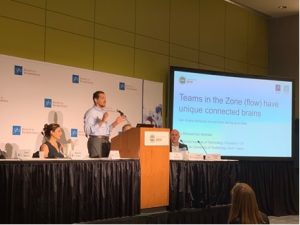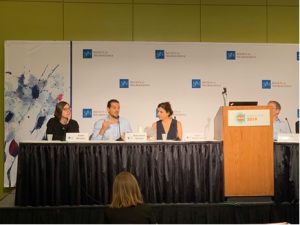The abstract of Dr. Shehata (EIIRIS) in collaboration with Dr. Nakauchi (TUT) and Dr. Shimojo (Caltech) has been selected as one of top 50 out of 14000 posters for this press conference. The title of the abstract is: “Specific neural correlates integrate flow and social experience”.
The title of the press conference is: “Brain Imaging Reveals Neural Correlates of Human Social Behavior”. The press conference was moderated by Prof. Michael L. Platt, James S. Riepe University Professor of Psychology at University of Pennsylvania, PA, USA.
The video recording of the press conference is now online (by the Society for Neuroscience).
A summary of the press conference is provided below:
Advances in the study of human social behavior may lead to a better understanding of normal processes such as empathy and theory of mind, as well as dysregulated conditions including autism spectrum disorder. The findings were presented at Neuroscience 2019, the annual meeting of the Society for Neuroscience and the world’s largest source of emerging news about brain science and health.
People are incredibly social creatures, and our brains have evolved to support a wide array of complex social behaviors. Everyday experiences, such as empathizing with others and finding flow in teamwork, are supported by sophisticated neural circuits that researchers are just beginning to map out. A better understanding of the neural basis of social behaviors could also shed light on conditions such as autism spectrum disorder or social anxiety, in which social abilities are affected.
Today’s new findings show that:
- People have an intuitive and universal language of social touch consisting of a core set of gestures that can be used to communicate love, attention, happiness, sadness, gratitude and calming (Sarah McIntyre, Linköping University, Sweden).
- Holding hands with a romantic partner during a painful experience increases brainwave coordination between the individuals and reduces the perception of pain, providing a neural basis for understanding empathy (Simone Shamay-Tsoory, University of Haifa, Israel).
- “Team flow,” which occurs when a group of people reaches flow while working toward a common goal, is associated with a distinctive brain state and synchronization of teammates’ neurons (Mohammed Shehata, California Institute of Technology and Toyohashi University of Technology, Japan).
- A previously unknown type of neuron in the amygdala of monkeys simulates a social partner’s mental decision processes, allowing an individual to predict its partner’s intentions and choices (Fabian Grabenhorst, University of Cambridge).
- Neurons in the human prefrontal cortex that reflect the thoughts and beliefs of other individuals may support theory of mind (Ziv Williams, Harvard University).
“The neuroscience advances presented today expand our understanding of how our brains process social information, enabling us to live in our complex society,” said Michael Platt, PhD, a professor at the University of Pennsylvania who studies decision processes. “These advances provide potential new avenues for researching empathy, theory of mind and even conditions such as autism spectrum disorder.”


